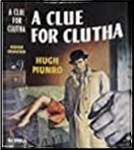Sat 2 Jan 2021
An Archived PI Mystery Review by Bob Adey: HUGH MUNRO – A Clue for Clutha.
Posted by Steve under Reviews[2] Comments
HUGH MUNRO – A Clue for Clutha. Clutha #3. Macdonald, 1960. No US edition.

Scottish detectives are invariably portrayed as hard men, but none is harder than Clutha, the Dockyards detective. In this, his third reported case (and my first meeting with him) the book commences with the suicide of an old friend, whose only son has been murdered at a West Coast (Scottish) resort.
Clutha determines to investigate and uncovers a heaving brew of villainy – and even buried treasure. The hardness and relentlessness of the man come over vividly and the writing is well above average. The action is fast and fairly furious, and the impact of the opening chapter is something you won’t forget in a hurry.
The Clutha series –
Who Told Clutha (n.) Macdonald 1958
Clutha Plays a Hunch (n.) Macdonald 1959
A Clue for Clutha (n.) Macdonald 1960
The Brain Robbers (n.) Hale 1967
Clutha and the Lady (n.) Hale 1973
Get Clutha (n.) Hale 1974
Evil Innocence (n.) Hale 1976
Editorial Notes: Only the first two have had US editions. For some biographical information on the author, go to Steve Holland’s Bear Alley blog here.
Steve describes Clutha as “Scotland’s answer to Philip Marlowe, a tough, bowler-hatted, uncrushable detective who worked for a Glasgow shipyard. He had a nice turn of sentimentality and a thorough knowledge of all kinds of infighting and trickery.” I don’t know whether that classifies him as a PI or not.
And apologies for the badly out-of-focus cover image. At the moment, it is the best I have been able to come up with. This is a scarce book. There are only two copies offered for sale on abebooks, for example; luckily one of them supplied a very small photo of the cover, which is what you see here.
UPDATE: I have found a review of this book online, complete with cover image, one I can’t borrow, but it does say that “This is the first Clutha story to move away from shipyard goings on. In later novels he retires from the yard and becomes a private detective.” I’m going to add PI to the title of this review.
January 2nd, 2021 at 8:10 pm
I knew about Clutha and Munro but never read one. I’ll have to be on the lookout now.
January 2nd, 2021 at 9:01 pm
I found the second in the series on eBay for $8.00 (the US edition) and it’s winging its way to me now. I imagine any UK edition is going to be Hard to Find.